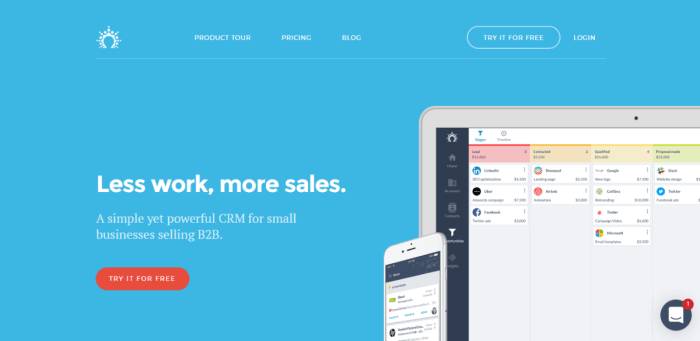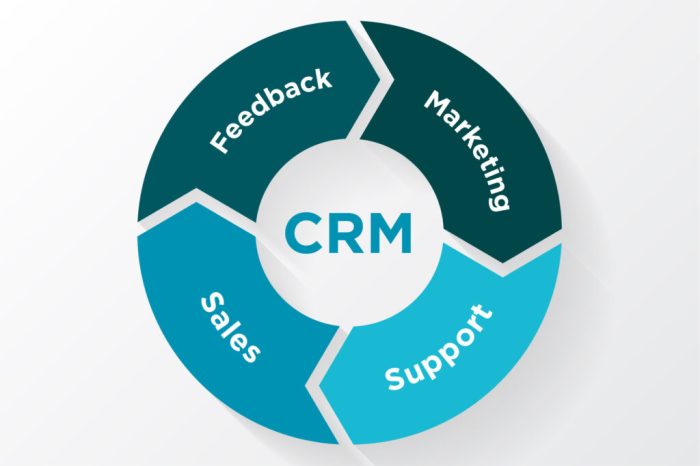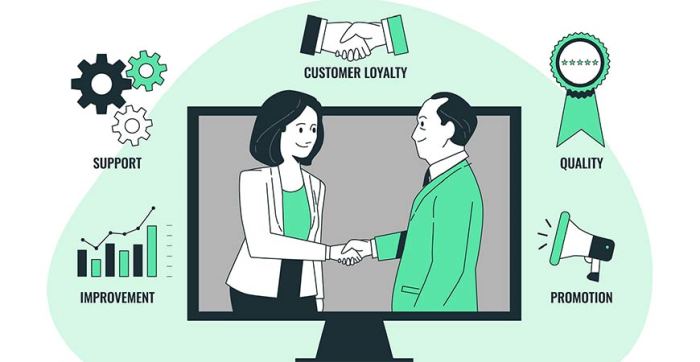Sales crm software for small business – In today’s competitive landscape, small businesses need every advantage they can get. Efficient sales processes are crucial for growth, and that’s where a Customer Relationship Management (CRM) system comes in. But with so many options available, choosing the right sales CRM software for your small business can feel overwhelming. This comprehensive guide will walk you through everything you need to know, helping you find the perfect fit to streamline your sales, boost productivity, and ultimately, increase revenue.
Understanding the Importance of Sales CRM for Small Businesses: Sales Crm Software For Small Business
A sales CRM isn’t just a fancy database; it’s a central hub for all your customer interactions. It helps you manage leads, track opportunities, automate tasks, and analyze sales performance – all in one place. For small businesses, where resources are often limited, a well-chosen CRM can be a game-changer. Here’s why:
Key Benefits of Using a Sales CRM:, Sales crm software for small business
- Improved Lead Management: Organize and prioritize leads effectively, ensuring no potential customer slips through the cracks. Features like lead scoring and automated workflows help you nurture leads and convert them into sales.
- Enhanced Customer Relationships: Maintain a detailed history of each interaction with every customer, enabling personalized communication and building stronger relationships. This fosters loyalty and repeat business.
- Increased Sales Productivity: Automate repetitive tasks like email marketing, follow-ups, and reporting, freeing up your sales team to focus on closing deals.
- Better Sales Forecasting: Gain valuable insights into your sales pipeline, allowing you to accurately forecast future revenue and make data-driven decisions.
- Improved Team Collaboration: Centralize all customer data, ensuring everyone on your team has access to the information they need, promoting seamless collaboration and eliminating communication silos.
- Streamlined Sales Processes: Automate and optimize your sales process from lead generation to closing the deal, improving efficiency and reducing the sales cycle length.
Choosing the Right Sales CRM Software: Key Factors to Consider
Selecting the right CRM depends on your specific needs and budget. Consider these crucial factors:

Source: solutionsuggest.com
1. Size and Features
Small businesses often benefit from CRMs with user-friendly interfaces and a focus on essential features. Avoid overly complex systems with functionalities you won’t use. Look for intuitive dashboards and easy navigation.

Source: getapkmarkets.com
2. Integration Capabilities
Consider how the CRM will integrate with other essential business tools you already use, such as email marketing platforms (Mailchimp, Constant Contact), accounting software (Xero, QuickBooks), and social media platforms. Seamless integration saves time and improves data consistency.
3. Pricing and Scalability
CRMs come with various pricing models, from monthly subscriptions to one-time purchases. Choose a plan that fits your current budget and allows for scalability as your business grows. Many offer tiered pricing based on the number of users and features.
4. Customer Support
Reliable customer support is essential, especially when dealing with a new software system. Look for CRMs with readily available support options, such as phone, email, and online chat. Check user reviews to gauge the quality of their support.
5. Mobile Accessibility
In today’s mobile-first world, access to your CRM on the go is crucial. Ensure the CRM offers a user-friendly mobile app, allowing your sales team to manage leads and track progress from anywhere.
Top Sales CRM Software Options for Small Businesses
The market offers a wide array of CRMs. Here are a few popular and reputable options:
- HubSpot CRM: A popular and powerful free CRM with a wide range of features, including contact management, deal tracking, and email integration. It scales well as your business grows.
- Zoho CRM: A comprehensive and affordable CRM offering a wide range of features, including sales automation, customer support, and marketing automation tools. It’s known for its robust features at a competitive price point.
- Salesforce Sales Cloud (Essentials): While Salesforce is known for its enterprise-level solutions, their Essentials plan offers a streamlined CRM solution tailored to smaller businesses. It provides a solid foundation for growth.
- Pipedrive: A sales-focused CRM known for its user-friendly interface and intuitive pipeline visualization. It’s ideal for businesses that prioritize sales process management.
- Freshsales: A feature-rich CRM that provides a balance between affordability and functionality. It offers strong automation capabilities and excellent reporting tools.
Remember to explore free trials or demos before committing to a paid plan to ensure the CRM aligns with your specific requirements.
Implementing and Maximizing Your Sales CRM
Successfully implementing a CRM involves more than just signing up for an account. Here are some tips for maximizing its benefits:
- Data Migration: Carefully migrate existing customer data to the new CRM, ensuring accuracy and consistency. This is a crucial step for avoiding data loss and ensuring a smooth transition.
- User Training: Provide comprehensive training to your sales team on how to use the CRM effectively. This ensures everyone understands the system and can leverage its features to their full potential.
- Process Optimization: Use the CRM to streamline and optimize your sales processes, identifying bottlenecks and areas for improvement. Regularly review and adjust your processes as needed.
- Data Analysis and Reporting: Leverage the CRM’s reporting features to track key metrics, analyze sales performance, and identify areas for growth. Use this data to inform your sales strategies and make data-driven decisions.
- Regular Maintenance: Keep your CRM updated with the latest features and security patches. Regularly clean and organize your data to ensure its accuracy and efficiency.
Frequently Asked Questions (FAQ)
- Q: How much does sales CRM software cost? A: The cost varies greatly depending on the provider, features, and the number of users. Some offer free plans with limited features, while others have monthly or annual subscription models ranging from a few dollars to hundreds of dollars per month.
- Q: Is sales CRM software right for my small business? A: If you’re struggling to manage leads effectively, track sales opportunities, or improve team collaboration, a sales CRM can significantly benefit your business. Even small businesses can benefit from improved organization and efficiency.
- Q: How long does it take to implement a sales CRM? A: Implementation time depends on the complexity of the CRM and the size of your business. It can range from a few days to several weeks. Proper planning and training are crucial for a smooth implementation.
- Q: What are the key metrics to track in a sales CRM? A: Key metrics include lead conversion rate, deal closure rate, average deal size, sales cycle length, and customer lifetime value. Tracking these metrics provides valuable insights into sales performance and areas for improvement.
- Q: Can I integrate my existing software with a sales CRM? A: Many CRMs offer integration capabilities with popular business tools like email marketing platforms, accounting software, and social media platforms. Check the CRM’s integration options to ensure compatibility with your existing systems.
Conclusion
Investing in the right sales CRM software is a strategic move for any small business aiming for growth. By carefully considering your needs, exploring different options, and implementing the system effectively, you can unlock significant improvements in sales productivity, customer relationships, and overall business success. Don’t let your business fall behind – embrace the power of a well-chosen CRM and watch your sales soar!

Source: jumpstartmag.com
References
Call to Action
Ready to transform your sales process? Explore the CRMs mentioned above and choose the one that best fits your business needs. Start your free trial today and experience the difference!
FAQs
What is the average cost of sales CRM software for small businesses?
Costs vary greatly depending on features and the number of users, ranging from free options with limited functionality to several hundred dollars per month for more comprehensive solutions.
How long does it typically take to implement a sales CRM?
Implementation time depends on the complexity of the software and your business’s processes. Simpler systems can be implemented within weeks, while more complex ones may take months.
What are some key features to look for in a small business CRM?
Essential features include contact management, lead tracking, sales pipeline visualization, reporting and analytics, and ideally, integration with other business tools.
Can I integrate my CRM with other software I use?
Many CRMs offer integrations with popular business tools like email marketing platforms, accounting software, and e-commerce platforms. Check for compatibility before selecting a CRM.
